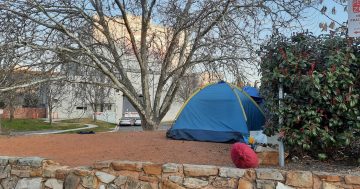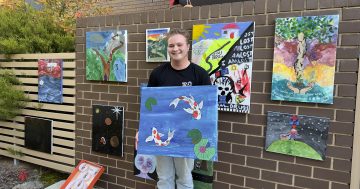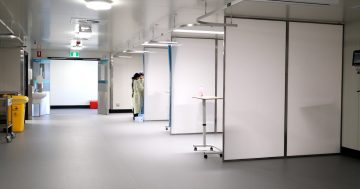
Homeless people and community housing residents don’t bear responsibility for Canberra’s COVID-19 outbreak. Photo: File.
When a novel coronavirus, with no known effective treatment or vaccination, arrived in Canberra in 2020, the health advice was simple. Stay home, stop the spread, save lives.
A week later, the Prime Minister declared there would be a moratorium on evictions from private and social rental homes for all households unable to make rent due to loss of income from the economic fallout of COVID-19.
With that, the argument many housing advocates, particularly Aboriginal and Torres Strait Islander people had been making for years, was confirmed true.
An affordable, safe and secure home that is not crowded and is of sufficient amenity to enable constant modulation of inside temperature is a critical social determinant of good health.
Within weeks, providers of congregate accommodation for people on low incomes, including people experiencing homelessness, approached ACT Shelter with a proposal to establish COVID-19 response working groups to devise and enact COVID-19 plans.
Housing ACT did likewise. As 2020 went on, it seemed, for a moment, that we had dodged a bullet.
On 12 August that all changed as positive wastewater detections became a positive case, then a dozen positive cases, and today, there are hundreds of Canberrans ‘learning to live with COVID-19′, to paraphrase the NSW Premier.
Some of those Canberrans reside in social housing communities in Canberra’s inner north. Others present to material aid providers for food and practical help to meet the costs of living.
Some of these fellow Canberrans have been subject to innuendo, scuttlebutt and vitriol on social media. Rumours about breaking quarantine orders and starting further chains of community transmission by absconding from residential sites in hard lockdown went viral.
Perhaps Canberrans might walk a mile in the boots of people who have been subject to hard lockdown after the places they call home were publicly listed as ‘close contact’ exposure sites for a potentially deadly virus.
The proportion of positive cases that can be linked to the sites I am aware of equates to about 2.5 per cent of total confirmed cases in the ACT.
Proportionate to the total number of Canberrans who call social housing home, this suggests these residents are three times less likely to have tested positive to COVID-19 than their share of the ACT population (7 per cent of Canberrans live in social housing or are experiencing homelessness).
Much of this is due to significant preparatory work by members of the organisation I manage, on the ground response by ACT Health, Housing ACT, community health services and material aid and social support providers helping residents in the quarantined sites each and every day since late August.
Far from the viral rumours that people in social housing wilfully jeopardised the health and wellbeing of their fellow Canberrans by absconding from quarantine sites to purchase alcohol, pouched tobacco and illegal drugs, the reality is we owe them a debt of gratitude. Only a small number of confirmed cases can be linked to guests of our homelessness services and residents of social housing.
Finally, I want to acknowledge the hard work by the people involved in the multi-agency response at Ainslie and Turner and to member services of ACT Shelter who have worked very closely with ACT Health to stand up surveillance testing for COVID-19 at sites in the inner-city where people experiencing homelessness and social tenants seek support; for putting in dozens of extra unpaid hours to the response to COVID-19 in the ACT since 12 August to limit further spread of community transmission, stump up material aid and social support for people directly affected and keep the rest of us informed of developments as the situation here evolves.
I want to particularly thank ACT Shelter members for working directly with ACT Health, Housing ACT and community partners from the alcohol and other drug, health consumer/peer, community mental health and housing support services, as well everyone who put money and in-kind resources on the table to support the response to one of the most serious public health crises our city has faced.
Nobody asks to contract a potentially deadly virus, and no evidence has been put to me that anybody has intentionally or wilfully been out in the community knowing they have.
To paraphrase the Chief Minister’s now-famous closed caption misinterpretation: I am Ken Behrens.
Stay kind, stay safe and stay out of online discussion groups doing more harm than good.
Travis Gilbert is the Chief Executive Officer for ACT Shelter, a not-for-profit organisation funded by the ACT Government providing advocacy and strategic advice on systemic issues for housing consumers in the ACT.





















